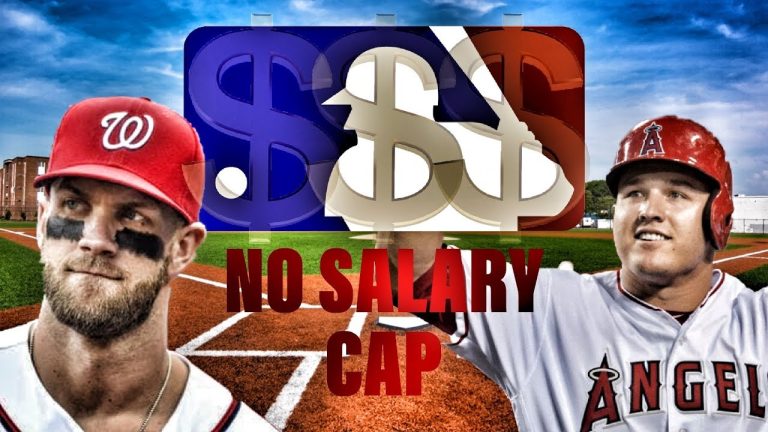
Title: Revolutionizing Baseball: Unleashing the Potential of Salary Cap in Contracts
Introduction:
In the realm of professional sports, baseball has long been synonymous with astronomical contracts and jaw-dropping salaries. Yet, the absence of a salary cap in Major League Baseball (MLB) has sparked heated debates over competitiveness and financial fairness. As the pressure to level the playing field intensifies, calls for implementing a salary cap in baseball contracts have gained momentum. In this article, we delve into the potential benefits and implications of embracing this revolutionary shift, exploring how a salary cap could reshape the landscape of America’s pastime, ensuring a more balanced and sustainable future for the game.
How is the salary cap structured?
The salary cap operates through a complex calculation that evaluates the league’s revenue and allocates approximately 48% of that revenue towards player expenses. This player cost figure consists of two components: player benefits and player salaries. By utilizing this formula, the salary cap ensures a fair distribution of financial resources while maintaining a balance between the league’s revenue and player compensation.
What does the term soft salary cap mean?
A soft salary cap is a type of salary cap that permits teams to exceed the designated cap, however, it comes with certain consequences. While hard salary caps strictly prohibit teams from surpassing the cap, soft salary caps offer some flexibility but restrict the privileges teams have in free agency. Additionally, if a team exceeds the luxury tax cap, they are obligated to pay a luxury tax on every dollar spent over the cap. With these measures, soft salary caps aim to maintain a level playing field while still allowing teams some leeway in managing their finances.
What are the consequences of exceeding the cap?
In the world of sports, staying within the salary cap is crucial for teams to maintain financial balance and fair competition. However, what happens if a team dares to cross that line? Well, the consequences can be severe. Going over the cap leads to hefty fines, with teams facing penalties upwards of five million dollars for each violation. Moreover, in more severe scenarios, teams may have to face even harsher punishments, such as having their valuable draft picks confiscated entirely and player contracts being rendered void.
Breaking the salary cap is not a risk worth taking for any sports team. The financial repercussions can be staggering, with fines of millions of dollars awaiting those who dare to exceed the limits. These substantial penalties serve as a strong deterrent for teams, ensuring they maintain financial prudence and adhere to the rules. Beyond monetary fines, teams can face even more severe consequences if they repeatedly violate the cap. Losing valuable draft picks and having player contracts voided can severely impact a team’s future prospects, making it clear that staying within the cap is not just a matter of financial discipline but also a crucial aspect of maintaining fair competition.
Unveiling the Game-Changing Effects of Salary Caps in Baseball Contracts
Salary caps in baseball contracts have revolutionized the game by leveling the playing field and promoting fair competition among teams. By imposing a maximum limit on the amount of money a team can spend on player salaries, salary caps have effectively curbed excessive spending by wealthy franchises, ensuring that smaller-market teams have a fighting chance. This game-changing measure has not only enhanced the competitiveness of the sport but also fostered a more balanced and exciting league, captivating fans with unpredictable outcomes and creating a sense of parity that keeps them coming back for more.
Cracking the Code: How Salary Caps Shape Baseball’s Contract Landscape
Cracking the Code: How Salary Caps Shape Baseball’s Contract Landscape
As one of the most financially lucrative sports in the world, baseball’s contract landscape is heavily influenced by the implementation of salary caps. These caps not only serve as a means to maintain competitive balance among teams but also shape the way contracts are structured and negotiated. With a limited budget, teams must strategically allocate their funds, often resulting in shorter-term contracts with higher average annual values. The introduction of salary caps has created a dynamic environment where players and teams must navigate the complexities of the code to maximize their earning potential and build successful rosters.
The Salary Cap Revolution: Deciphering Its Influence on Baseball Deals
The Salary Cap Revolution has completely transformed the landscape of baseball deals, reshaping the way teams strategize and negotiate player contracts. With its implementation, teams are now forced to make calculated decisions, considering both the financial implications and the long-term sustainability of their rosters. This new era has given rise to a wave of innovative and creative deal structures, where teams are finding ways to maximize their limited salary cap space while still assembling competitive teams. As a result, we have witnessed a shift in player valuations, with teams placing a greater emphasis on versatile players who can contribute in multiple positions. The salary cap revolution has undeniably brought about a new era of baseball deals, challenging teams to think outside the box and pushing the boundaries of what was once considered conventional.
In order to enhance competitive balance and promote financial sustainability in Major League Baseball, implementing a salary cap in baseball contracts is a crucial step. By placing a limit on the amount of money teams can spend on player salaries, it would create a level playing field and prevent wealthier franchises from dominating the league. This not only ensures fair competition but also encourages smaller market teams to invest in talented players, leading to a more exciting and unpredictable game. With a salary cap in place, baseball can truly thrive as a sport that values both financial stability and the spirit of fair play.
